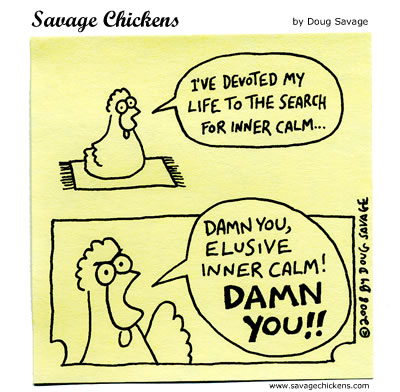Part Two of Six:
I keep six sentences written on a note card in my wallet. The second reads, Being disturbed is a choice.It doesn't feel like a choice though. Just because a reaction is experienced as an automatic reflex, it does not follow that the reflex is required or that the chain of reactions at work is beyond our control. Choice is involved in how we train ourselves to respond to the world. Consider for a moment the following event,
I speak from experience when I say that the problem with pranks is that they do not always turn out the way we intend. The man dressed as a scarecrow did not expect to be punched in the face. More to the point we can see a disjunct between the immediate reaction of the man who punched him and the concern that flowed seconds later.
The man who threw the punch was, by some set of circumstances unknown to us, trained to respond with an acute fight or flight response when taken by surprise. He hits and he backs away. As the reflex fades, concern and rationality flow back as he then runs to the man, shows concern, and even hugs him. The training can explain why he responded as he did. If he wants to avoid doing it again, however, he will need to undertake to train himself in a different set of responses.

Our emotional reaction function in the same way. They may feel automatic but they are the result of training. Just as a young man is capable of tempering his fight or flight impulse so many of us are capable of training our responses to the world around us. Whether or not we engage in that training is a choice. It is our choice, if I may paraphrase the Apostle Paul, whether or not we take every thought captive and make it obedient to rationality.
My High School tennis coach was wont to yell, "Practice does not make perfect. Practice makes permanent!" His point being that experience alone does not lead to improved performance. Performing with appropriate form leads to increased performance. Performing with improper form leads to habit becoming more ingrained and more difficult to root out.
Physical response to stimuli and emotional response are not completely different things. Both are functions of the brain as well as the body and those can be trained. I've trained myself over the years to get outraged by certain predictable manifestations of incompetence in my workplace.
Even after I had some success in altering my expectations, there were still habits of frustration to overcome. Inner calm is not something you find, it is something you work for or achieve. It is much more like the backhand my coach attempted to teach us on the court than the sudden understanding that arrives six minutes after we hear a joke. Learning respond calmly to a wide variety or unexpected situations requires even more training.
Keeping calm does not mean an individual does not react to a situation, it only means they act in a calm manner. In the workplace I may still react to a co-workers, incompetence but not in a way I would have difficulty defending in Human Resources. In the home I am an active parent, but do not react in a way that has me apoligize to my children later in the day. If I am spooked at a prank, I do not react in such a way that puts me at risk of the charge of assault and battery. It wasn't easy or necessarily straight-forward but it wasn't like I was giving up cigarettes, red meat, or cursing. OK, maybe it was like the last two.
Our expectations of the universe are often flawed. Our responses to the events around us are often based on flawed logic. But if we keep to the habits that were formed while we lived under flawed logic, that too is a choice. If I find myself disturbed by my spouse, my work, my dog, my children, or any other thing outside of my own control, I am confronted with the opportunity to ask myself, is my response appropriate? Perhaps an action is called for, is there any reason that I should not do it calmly and with purpose?
Part Three: Dressing the Part

No comments:
Post a Comment